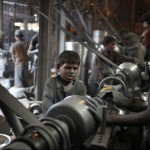Workers' co-op leaders came together to discuss their present and future.
from the International Labour Organization
The economic contribution of cooperatives is often undervalued, if not completely ignored. But the reality is that the top 300 cooperatives worldwide have a turnover of more than US$ 1.9 trillion combined, which is more than the GDP of Italy. Cooperatives have also played a key role in resolving the economic crisis that erupted in 2008. ILO research shows that cooperative enterprises across sectors and regions are proving to be relatively more resilient to the current market shocks than their capital-centred counterparts.
In Quebec, cooperatives are responding to the needs of the labour market by mobilizing both skilled and unskilled workers. In Asia, particularly in India, cooperatives are helping to organize workers in the informal economy. In Africa, trade unions and cooperatives are working together to promote freedom of association and the right to collective bargaining.
That does not mean that cooperatives are a panacea for workers and the economy as a whole. Depending on the country, cooperatives can face many challenges, one of them being how to attract young workers at a time when global youth unemployment is affecting more than 73 million young women and men, aged 15 to 24.
The ILO’s Bureau for Workers’ Activities and the ILO’s Cooperative Branch recently organized a seminar on the relationship between trade unions and worker cooperatives. Below are some of the participants’ opinions about the current challenges and opportunities for cooperatives in their countries and regions.
 |
José Orbaiceita
President of Worker Co-op Federation of Argentina – FECOOTRA
|
“During the crisis of 2001, our Federation (FECOOTRA) supported workers who wanted to prevent their companies from going bankrupt, by providing them with legal and accounting advice. We helped them mobilize and supported the processes that led to the enactment of expropriation laws by parliament. There was a whole lot of support work going on. A good example is the case of the paper factory in my city, La Plata, which the workers recovered with the help of our federation. The workers bought the bankrupt factory after a few years, and today they are the owners of a company that continues to produce paper. There are hundreds of similar cases. The recovery process didn’t end with the crisis.
In Argentina and in the MERCOSUR trading area (composed of Argentina, Brazil, Paraguay, Uruguay and Venezuela) as a whole, worker cooperatives are thriving with the support of governments in the region. In that sense, we are not neutral. For us, it’s not the same thing to have a popular government supporting the cooperative movement or a right-wing government trying to destroy it. Today in Argentina, the cooperatives and mutual societies produce 10 percent of the national GDP, make up 30,000 companies and offer half a million jobs. Our goal is that in 20 years’ time, by 2030, we produce 30 percent of GDP, and that way achieve a more integrated, equitable and fair economy.”
 |
Claude Dorion
Director General MCE Conseils-Quebec
|
“Globally, we have challenges in maintaining the balance between the associative nature of the ownership of the business and its operational efficiency.
Whatever sector we operate in, we will always attempt to bring together the technical expertise required within the cooperative and the resources to finance its development within market conditions.
Another challenge for us in Quebec is that the labour market is divided into two. On the one hand, we have skilled workers with high levels of education who have no difficulty finding jobs. This reduces the availability of skilled workers to create cooperatives, since the private labour market will give them reasonable working conditions. On the other hand, the unskilled workers are very favourable to the creation of cooperatives in order to secure their economic activities and employment opportunities. The challenge is to overcome this dichotomy within the labour market, to make sure that in each cooperative there are both unskilled workers for production operations but also skilled workers with management expertise."
 |
Dr Vrajlal Sapovadia
Director of Shanti Business School-India
|
“In India, there are 600,000 cooperatives, having 250 million members… The Indian cooperatives boosted India’s economy and provided sustainability at the time of the 2008 crisis. There are around 20 million jobs in the economy which are either directly or indirectly created or supported by cooperatives. For example, in my city Ahmedabad, SEWA (Self-Employed Women’s Association), which has over 1.3 million members, is not just a trade union but also a movement of several types of membership-based organizations, including cooperatives.
SEWA has a strategy of “struggle and development” – the union struggles for workers’ rights while cooperatives and other collective organizations provide opportunities and development for workers. Among other services, it provides support to home-based workers – the majority of them women – in securing better piece rates (the pay given to a subcontracted worker for each item produced, such as home-rolled cigarettes, incense sticks, papadam or embroidery) for their work.”
 |
Roberto Cardinale
International Relations Delegate for Generazioni Emilia-Romagna, branch of Lega cooperative-Italy
|
“In Europe, cooperatives should be more attractive nowadays, especially if they wish to fulfil the objective of the ‘cooperatives’ decade’, which is to get cooperatives to be the most chosen model of enterprises by 2020 and to attract young workers and entrepreneurs.
In Italy, the case of social cooperatives is well worth noting for other countries that are looking into different models of providing social services. Budget constraints at a national level create a gap between the need and the provision of social services, with the creation of a ‘black market’ filling this gap. For instance, take the case of elderly care. There is a substantive ‘black market’ in the Emilia-Romagna region where over 120,000 workers, mostly migrant domestic workers, are providing elderly care services for individual households. Addressing this need in a sustainable way is possible if cooperatives and trade unions join forces and establish cooperatives of care workers to provide this service.”
 |
Stirling Smith
International programmes manager at the Cooperative College, Manchester
Co-author of How the SYNDICOOP approach has worked in East Africa
|
“Syndicoop was a useful model. It showed how the trade union and the cooperative movements can collaborate to organize workers in the informal economy. It was based on ILO norms, particularly ILO Recommendation 193, as well as the ILO Core Conventions Nos. 87 and 98 on Freedom of Association and Collective Bargaining. For example, the motorcycle-taxi drivers in Kigali, Rwanda, developed a unique kind of organization which is a hybrid between a trade union and a cooperative.
This model of organization is a way of bringing people together through solidarity and mutual assistance. It is the essence of trade unionism and cooperation and that’s what the Syndicoop approach tried to develop. More needs to be done. I think it is replicable in other contexts, but more needs to be done, especially at the national levels.”
ILO guidelines to promote cooperatives
ILO Recommendation 193 on the Promotion of Cooperatives (2002) provides guidance on cooperative policy and legislation, stressing the need for a level playing field for cooperatives and other enterprises. Over 70 countries have revised their cooperative legislation since the adoption of the Recommendation ten years ago, in line with its provisions.
All cooperative laws adopted since then have reduced state influence over, and state sponsoring of, cooperatives, increased cooperative autonomy and self-reliance, and cut links that might have existed between cooperatives and political organizations.

 The ILO is the international organization responsible for drawing up and overseeing international labour standards. It is the only 'tripartite' United Nations agency that brings together representatives of governments, employers and workers to jointly shape policies and programmes promoting Decent Work for all. This unique arrangement gives the ILO an edge in incorporating 'real world' knowledge about employment and work.
The ILO is the international organization responsible for drawing up and overseeing international labour standards. It is the only 'tripartite' United Nations agency that brings together representatives of governments, employers and workers to jointly shape policies and programmes promoting Decent Work for all. This unique arrangement gives the ILO an edge in incorporating 'real world' knowledge about employment and work.






 Consumers rely on certification labels to ensure the products they buy are free of human and labor rights violations. Unfortunately, this isn’t always true. Take action and demand that IMO’s Fair for Life certification label adopt reforms to protect workers.
Consumers rely on certification labels to ensure the products they buy are free of human and labor rights violations. Unfortunately, this isn’t always true. Take action and demand that IMO’s Fair for Life certification label adopt reforms to protect workers. 